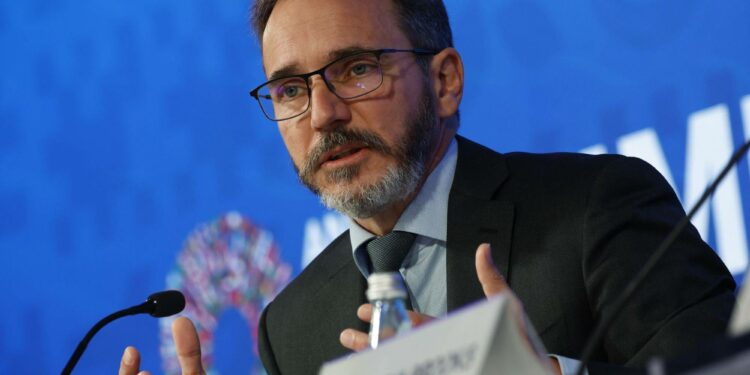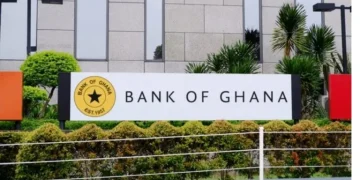- Africa’s Quiet Resilience Amid a Fragmenting Global Economy
As the world economy splutters under the weight of protectionism, fiscal fatigue, and a waning globalisation dividend, Sub-Saharan Africa finds itself at a familiar crossroads, navigating headwinds not of its making, yet showing glimmers of resilience that the IMF says could outshine most advanced economies.
According to the IMF’s latest World Economic Outlook (October 2025) issued today in Washington, DC, at the sidelines of the ongoing Annual Meetings of the IMF/World Bank, global output is expected to slow from 3.3 percent in 2024 to 3.2 percent in 2025 and 3.1 percent in 2026. Growth in advanced economies, battered by slowing productivity, tariff wars, and anti-immigration politics, will stagnate around 1.6 percent. In contrast, Emerging Markets and Developing Economies (EMDEs) will expand at a healthier 4.2 percent in 2025, with Sub-Saharan Africa forecast at 4.1 percent, inching up to 4.4 percent by 2026.
A Continent Defying the Global Slowdown
That Africa’s growth is projected to strengthen while the world slows underscores the region’s counter-cyclical story. Unlike advanced economies now trapped between rising debt and ageing populations, many African nations are reaping the dividends of demographic momentum, domestic investment in infrastructure, and improving macro-management frameworks built since the pandemic.
Ghana, Nigeria, and Kenya are representing diverse economic models by exemplifying this balancing act. Ghana, still emerging from its IMF-supported debt-restructuring programme, is poised to benefit from improved fiscal discipline and a return of investor confidence. The country’s growth path will depend on sustaining fiscal consolidation beyond the Fund’s programme, boosting non-traditional exports, and deepening reforms in energy and public-sector efficiency.
Nigeria’s growth, according to the report, is projected at 3.9 percent in 2025, reflects partial reforms in the foreign-exchange market and fuel-subsidy rationalisation. Yet the IMF warns that fiscal vulnerabilities and underperforming oil production remain drag anchors on broader momentum. For South Africa, the country is expected to grow by only 1.1 percent, structural bottlenecks, power constraints, logistics inefficiencies, and labour rigidities continue to weigh on output despite an improving global commodity outlook.
The IMF’s message to policymakers is clear: resilience alone is not recovery. The Fund urges Sub-Saharan African governments to rebuild fiscal buffers, mobilise domestic revenue, and accelerate governance reforms, especially as external aid flows diminish and concessional finance tightens. “Mobilising domestic resources, including through governance and administrative reforms, is essential as external aid declines,” the report stresses.
For Ghana, this warning is particularly resonant. With public debt of GDP and interest costs crowding out capital expenditure, the country’s path forward will depend on how decisively it broadens the tax base, enhances transparency in state-owned enterprises, and leverages industrial policy without sliding into protectionism. The IMF cautions that while industrial strategies may aid resilience, “full consideration should be given to opportunity costs and trade-offs involved in their use.”
Meanwhile, the IMF’s October 2025 report frames the global economy as one in “flux”, a system grappling with the fallout of U.S. tariffs, shrinking development aid, and tightening migration policies. Yet within this fragmentation lies opportunity for Africa.
As global supply chains realign, nations with improving business climates, digital capabilities, and renewable-energy potential could attract a new wave of investment. Ghana’s Special Economic Zones and Kenya’s tech-hub ecosystem are already positioning themselves as near-shore alternatives in manufacturing and services. The African Continental Free Trade Area (AfCFTA) could magnify these gains if member states harmonise customs regimes and logistics infrastructure.
The Road Ahead
The wider message is sobering yet hopeful: the next decade will not reward complacency but strategic discipline. Africa’s future growth story will depend less on commodity windfalls and more on institutional resilience, productivity reforms, and the ability to translate youth demographics into skills and innovation.
For Ghana, the challenge is not merely surviving the IMF programme but leveraging it as a foundation for transformation, anchoring macro stability, restoring investor trust, and driving industrial diversification that withstands the volatility of global trade realignments.
“In times of uncertainty, scenario planning and pre-designed policy playbooks can improve preparedness and credibility,” the IMF notes, a statement that could well be Ghana’s guiding mantra in 2025 and beyond.








